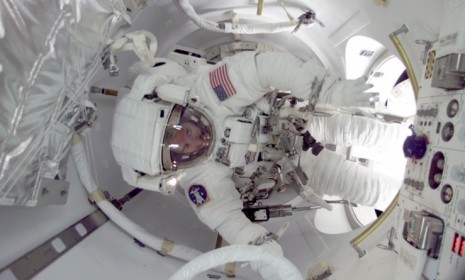Does space travel damage eyesight?
An increasing number of astronauts who've spent a month or more aboard the International Space Station are visiting the optometrist

A free daily email with the biggest news stories of the day – and the best features from TheWeek.com
You are now subscribed
Your newsletter sign-up was successful
If you were eyeing a $200,000 Virgin Galactic ticket to the stars, you might want to read on. A new study from the University of Texas suggests that astronauts who spend more than 30 days in a weightless, outer-space environment encounter serious ocular problems. Here's what you should know:
How does outer space affect the human body?
Researchers already know that spending long periods of time in a zero-gravity environment — such as that inside the International Space Station (ISS) — results in loss of bone density and damage to the body's muscles. That's partly why stays aboard the ISS are capped at six months. And now, a number of NASA astronauts are reporting that their 20/20 vision faded after spending time in space, with many needing glasses once they returned to Earth.
The Week
Escape your echo chamber. Get the facts behind the news, plus analysis from multiple perspectives.

Sign up for The Week's Free Newsletters
From our morning news briefing to a weekly Good News Newsletter, get the best of The Week delivered directly to your inbox.
From our morning news briefing to a weekly Good News Newsletter, get the best of The Week delivered directly to your inbox.
What did researchers who examined the space-eyesight connection conclude?
The new study, published in the Journal of Radiology, examined the eyes and brains of 27 astronauts who had spent an average of 108 days in space. MRI scans showed that spending just 30 days in space resulted in a rare medical condition called intracranial hypertension — where "pressure inside the skull rises and presses on the brain and backs of the eyes," says Ian Sample at Britain's Guardian.
What kind of damage does that do?
For seven astronauts, intracranial hypertension flattened the backs of their eyeballs, resulting in more long-sightedness. In the case of four astronauts, the optic nerve, which transmits information between the eye's retina and the brain, was enlarged. It's not just eyesight that's affected: Three of the astronauts experienced pressure-related changes to the brain's pituitary gland, which manages a number of the body's functions, including the secretion of growth hormones.
A free daily email with the biggest news stories of the day – and the best features from TheWeek.com
What does this mean for space travel?
Long-duration space travel, like a months-long mission to Mars, may be facing another "potential limitation," says study lead author Larry Kramer. For its part, NASA says these findings are inconclusive, though it has vowed to study the space-eyesight connection in the future.
-
 Why is the Trump administration talking about ‘Western civilization’?
Why is the Trump administration talking about ‘Western civilization’?Talking Points Rubio says Europe, US bonded by religion and ancestry
-
 Quentin Deranque: a student’s death energizes the French far right
Quentin Deranque: a student’s death energizes the French far rightIN THE SPOTLIGHT Reactions to the violent killing of an ultraconservative activist offer a glimpse at the culture wars roiling France ahead of next year’s elections
-
 Secured vs. unsecured loans: how do they differ and which is better?
Secured vs. unsecured loans: how do they differ and which is better?the explainer They are distinguished by the level of risk and the inclusion of collateral